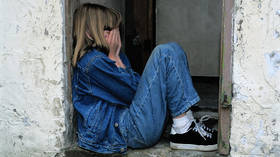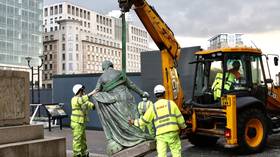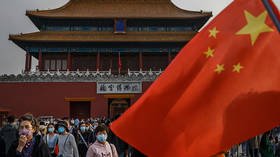It’s time to stop funding aid groups whose officials in disaster zones exploit women for sex
A committee of UK MPs was told this week that NGOs think they are above the law, after more allegations of sex abuse abroad surfaced. The only way to prevent this is to deny them the millions in funding they receive.
When publicly-funded bodies are accused of mismanagement of money or resources, or the appalling behaviour of their staff comes under fire, then any number of probes, inquiries or investigations may be called on. Sadly, it’s only when you threaten to turn off the money tap that anything is likely to change.
“The UN, the NGOs, believe they are above the law. Predators now target the aid industry to join because they know they get away with it,” as Professor Andrew MacLeod of Hear Their Cries, a charity fighting sex abuse in the aid sector, told the UK’s International Development Committee this week.
The latest sex scandal in the Democratic Republic of the Congo – a nation that has seen the depths of human depravity more often than most – revolves around 51 women who say they were offered employment in exchange for sex or were refused contracts if they declined, from officials working with the World Health Organisation, UN children’s agency UNICEF, Oxfam, Médecins sans frontières, the International Organisation for Migration, World Vision and others, during the 2018-20 Ebola crisis.
Far from all minds being focused on beating this horrific, flesh-eating disease that has killed thousands, it seems some officials were taking advantage of their posting to exploit local women for sex. Quite how that becomes a priority is a mystery to me.
These are exactly the type of international non-governmental organisations that suck up money from national governments, guilt-tripped into contributing to their huge bank accounts, while their officials occupy plush, air-conditioned offices in places like Geneva, New York and London.
The world many of them live in, one of patronising self-aggrandisement, could not be further than that of the wretched souls they are supposed to be helping – the victims of earthquakes, hurricanes, rampant diseases, war and worse.
Unbelievably, when they do turn up, supposedly to lend a hand in restoring some sort of structure to the stricken communities, it’s not ‘how can we help?’ that is first on their minds. It’s ‘where are your women?’
At a time when the most vulnerable people in the world are at their lowest point, some of those in positions of immense power, thanks to their privilege, decide they will use the opportunity to bribe and extort local women for sex. Like those NGOs in the Congo. Like Oxfam in Haiti. It really is that simple. And that evil.
So, for the United Nations, World Health Organization and others to declare they are investigating the allegations and to profess a “zero tolerance” towards sexual misconduct by their staff just won’t cut the mustard.
While his motives lay elsewhere when he announced an end to the US funding for the WHO – $900 million over two years – President Donald Trump may have made a prescient move.
He was chastised by fellow world leaders of the G7 at the time. Since then, the UK has actually renewed its own funding to WHO, making it the single largest contributor, with £340 million over four years, once the US withdraws. We even increased our input by 30 percent to reach that figure. What sort of suckers are we?
We have fallen wholesale for the PR that surrounds the UN and these NGOs. They are doing work on an international level that we could never hope to do on our own, because we have too many other issues on our plate to deal with. So they act as our proxy consciences.
The problem is that we are so keen to have them fill that role that little oversight is undertaken, and we choose to take them at their word. They tell us they have set up hotlines and reporting mechanisms, which naively we accept as effective means of combating wealthy and powerful sexual predators who use the cover of international aid to pursue their own sick agendas. It’s simply not enough.
The whole reporting and investigative procedure needs to be uprooted and replaced with something entirely different. For a start, more women are needed on the ground in key posts, directing operations and building trust from the moment a single aid boot hits the ground.
Internal inquiries into allegations need to be scrapped completely. They are a waste of time, more than likely to end in a cover-up or non-disclosure agreement-tainted resignation than in any sort of real justice.
Any investigation into alleged misdemeanours should be rigorous and unsparing, with a team drawn from outside the NGO sphere so we can be assured of probity and fairness. For too long, as one NYU human rights lawyer damningly put it, humanitarian organisations have been seen to operate within a “culture of impunity.”
This has to cease, and that means the funding has to as well, until this abhorrent behaviour and the enabling environment it thrives in is brought to account and stopped for good.
The statements, views and opinions expressed in this column are solely those of the author and do not necessarily represent those of RT.
















